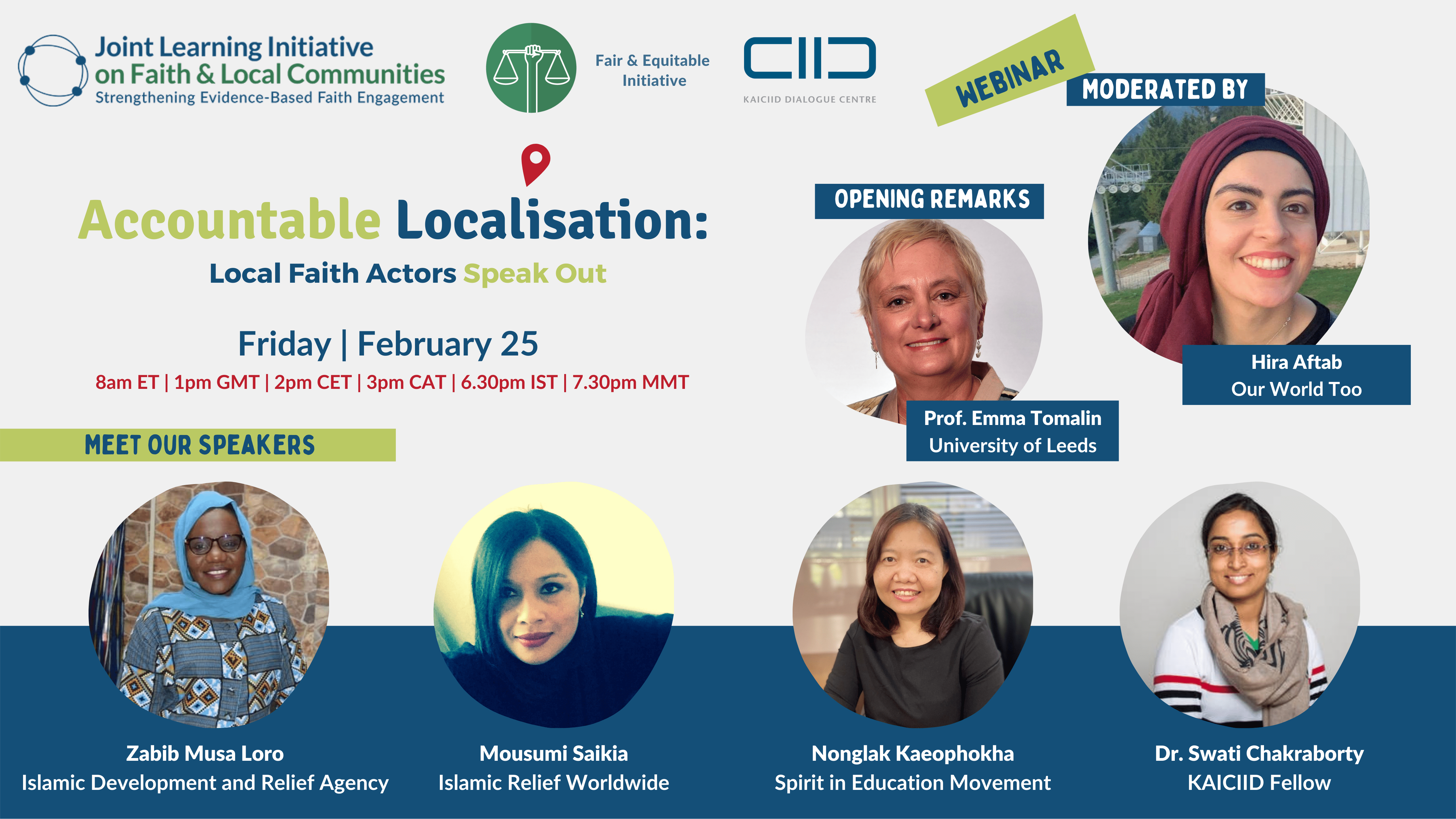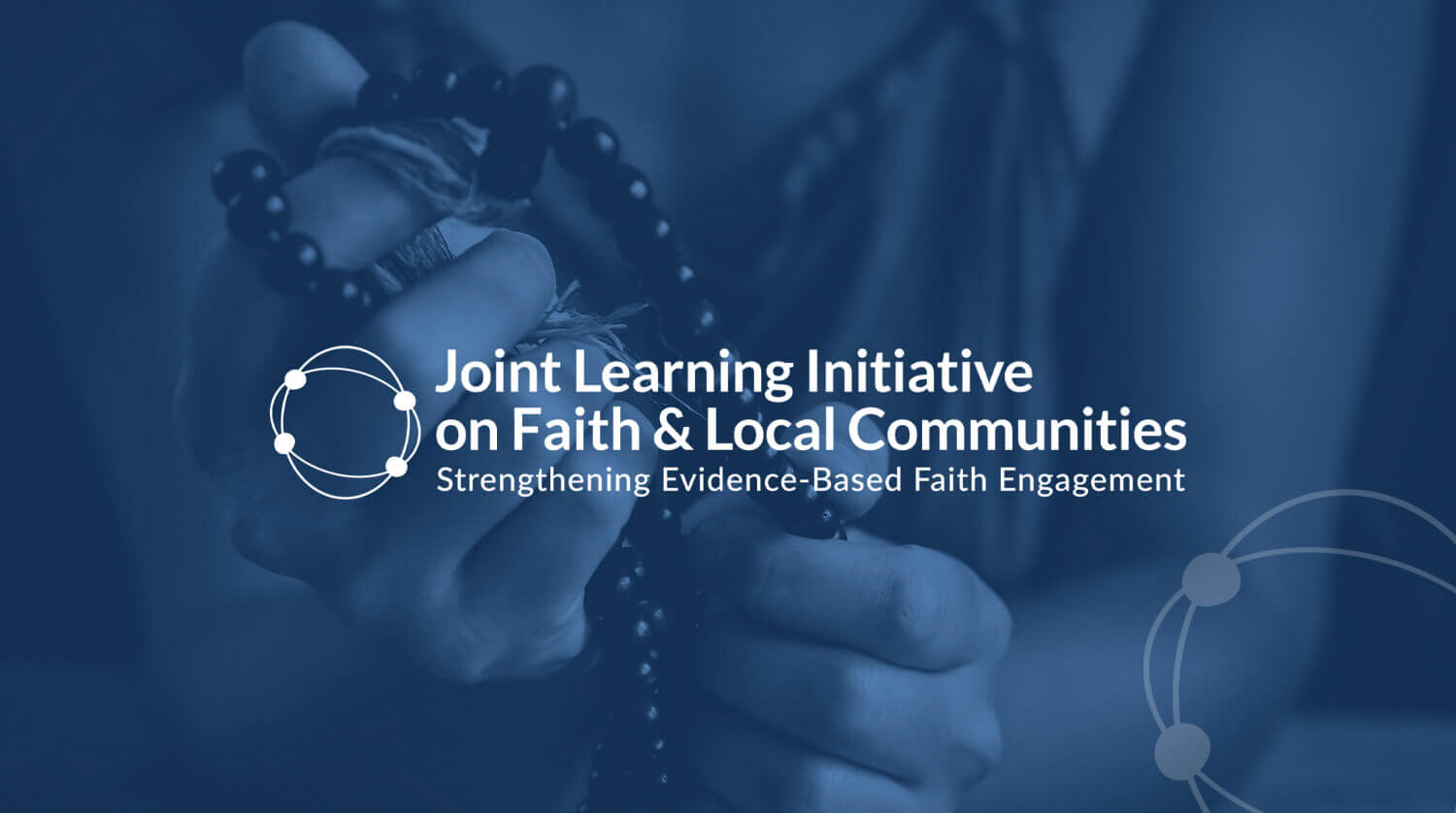The Fair & Equitable Dialogues Series continues to explore different challenging themes related to unequal power dynamics, decolonization and localization in international humanitarian, peacebuilding, and development work through showcasing research evidence and practices from diverse actors around the world.
On February 25, 2022, the series held its second public webinar on “Accountable Localisation: Local Faith Actors Speak Out” to investigate practical examples of localized action through the experiences of faith-inspired local and international partners.
Where does localisation succeed and where does it fail? How fair, equitable, relevant, and “local” are localisation efforts? What role does faith play in these contexts? How are the priorities and approaches of grassroots and international actors mutually reinforcing or diverging?
To engage with these questions, the webinar showcased different case studies from different regions around the world, including South Sudan, India, and Myanmar, inviting both international organizations and local faith actors to reflect on how to better engage with localisation efforts, and what practical recommendations, stemming from local experiences and stories, can lead to a more effective, fair, and equitable engagement with the localisation of humanitarian and development work.

The discussion started with opening remarks from Professor Emma Tomalin on JLI’s significant contributions, since its inception, in drawing attention to the roles and contributions of local faith actors and smaller informal faith-based organizations—who are under-represented at the global level and in academic studies—to development and humanitarian action while enhancing community well-being and resilience. Reflecting on 2016 Humanitarian Summit and the calls for “humanitarian action to be as local as possible and as international as necessary,” Professor Tomalin outlined a number of challenges and barriers that local faith actors face because of their faith identity, including false assumptions about their inability to be impartial and separate humanitarian from religious activities.
“While some organizations might strategically hide or sideline their religious identity through careful choices of how they name their organization, others might set up separate organizations to manage their humanitarian work and to keep it separate from their religious activities” – Professor Emma Tomalin
I. Key Themes
Challenges of Local-International Engagement
In the first part of the event, the 4 panelists reflected on local faith actors’ engagement with localisation efforts. They talked about the challenges they face in navigating the humanitarian and development sectors, in addition to the strategies they use to address these challenges.
Obstacles and challenges include:
- Language gaps and cultural divides between local and international actors. International actors use jargon and technical terms that are different from what local actors use in their local contexts.
- Strict donor requirements and bureaucratic paperwork that can be time consuming during humanitarian crises. Local actors sometimes have limited resources and time to provide those documents in order to get funding and rescue people in crisis.
- Funding restrictions and biased donor misconceptions, such as the belief that international and secular actors can do the work better than local and faith actors).
- Local faith-based organizations also face suspicions from different local conservative religious groups.
- The visibility of the faith element in local faith-based organizations can be exploited by the religious group that they belong to.
- International organizations put high expectations (e.g. organizational policies, capacities, scale and work history, and end-to-end compliance) that could become discriminatory and exclusionary of a large part of the civil society because only well-established and large organizations can fulfill.
- Stereotypes about local faith actors’ motivations to provide support (e.g. they are viewed as trying to convert or radicalize people).
To navigate these challenges, panelists discussed the opportunities that can arise from working with local faith actors. They highlighted the sustainable role of local faith actors in responding to humanitarian crises beyond the limited implementation period of the response. During times of crisis, local-to-local support is faster and more efficient than waiting for aid and funds from international or external actors.
“Local faith actors have a long-term commitment because they are part of the community. There’s no time limit for their support” – Nonglak Kaeophokha
From an international perspective, it is important to recognize the spiritual and religious beliefs of people and communities as integral to their well-being and their identity. Mousumi Saikia provided examples of local faith actors’ integration in the localisation of gender justice programmes, while acknowledging the clear tensions between gender and patriarchal interpretation of religious scriptures. Via behaviour change processes and building thematic technical capacities, local faith actors have become champions for change in addressing sexual and gender-based violence.
“Faith is – whether it’s visible or invisible – more than just a moral or spiritual expression. Traditional community structures and religious beliefs also provide support structure and a sense of identity, meaning and security to people in times of crisis. We have seen this particularly in the work we are doing with refugees and internally displaced people” – Mousumi Saikia
Panelists also mentioned the significance of international-local partnerships in bringing more visibility and recognition of local faith actors and local faith-based organizations. They discussed the importance of finding a “common goal” from not only religious commitments, but also cultural ones, for public benefit.
“Apart from the religious context, if we can contextualize and synchronize cultural commitment and traditional beliefs that would be a wonderful opportunity for, not only India, but for the entire world” – Swati Chakraborty
Cultural and Language Divides and the Risk of NGO-isation
In the second part of the webinar, panelists focused on the cultural and contextual divides between international and local actors, in addition to local faith actors’ concerns and fears of “NGO-isation” (i.e. becoming mini international organizations) and losing their unique faith assets and identities in the process.
In order to overcome these challenges, there is a need for a two-way process that builds on courage, consistency, trust, and cooperation. On the one hand, donors need to understand the complex world of faith and how faith-based organizations work without being dismissive and fearful of the faith elements. They also need to think through the terms of engagement with local faith actors and faith-based organizations s.
On the other hand, local faith actors need to ensure coherence between what they believe and their organizational behaviors and programs. Such clarity can strengthen their position in partnerships with international organizations who also have their own agendas. They also have a responsibility to have the courage to reclaim a space where they can define themselves and describe their mission and local capacities – what their faith identity means and how it can be operationalized. Very often it is local organizations who have to fulfill or follow a predetermined list of competencies and the skills which reinforces the top-down approach adopted by the majority of international organizations.
II. Recommendations
Walk the Talk – Localisation in Practice
Each panelist then reflected on how localisation approaches can actually work in practice from their own positionality as local and international faith-inspired actors. Recommendations included:
- Simplifying the bureaucratic processes that local faith actors and faith-based organizations must undergo in their partnerships with international actors (e.g. allowing for greater flexibility and reducing paperwork during humanitarian crises).
- Avoiding the top-down and utilitarian partnership models which frame local faith actors as only service providers – and instead approaching international-local partnerships as “friendships” that allow a space for deep listening, open and transparent dialogue, genuine engagement, and respect.
- Inclusion and participation of local faith actors as active actors in decision-making and governance rather than only perceiving them as service providers and passive recipients of capacity building programmes.
III. Media
Throughout the webinar, we shared a number of interactive polls to engage participants in the discussion and share their insights too! The majority of attendees thought that there has been progress in advancing the leadership and voice of local faith actors despite all challenges.
In an attempt to explore different grassroots and locally-rooted terms that could describe “localisation”–which is not a local term—attendees shared different answers to what localisation means to them, including “grassroots”, “trust local knowledge”, “agenda set by community”, and more.




Read more about the event and speakers here
Register to the upcoming Fair & Equitable Dialogue on April 29, 2022: Listening to the Stories of Local Faith Actors on COVID-19 Response






